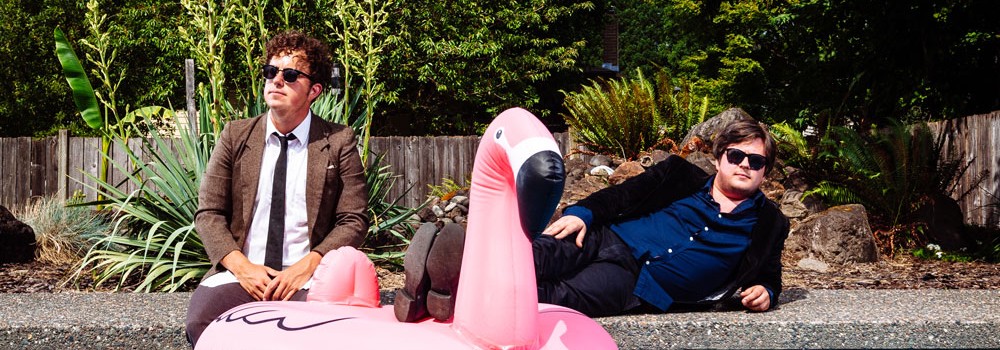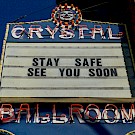 The Domestics’ Michael Finn and Leo LondonLeo London and Michael Finn have found a quiet table in a sunlit corner of NE Portland bar The Bye and Bye. The onset of early afternoon sun has yet to breach the veil of gray in the window behind the duo who are known creatively as The Domestics. From my position, both London and Finn appear as somewhat darkened silhouettes as we sit to chat about the band’s sophomore record, Little Darkness, originally set for release on September 1. But due to an unfortunate viral marketing blunder, the band recently split with their former label and the album's release has been pushed back to an unspecified date.
The Domestics’ Michael Finn and Leo LondonLeo London and Michael Finn have found a quiet table in a sunlit corner of NE Portland bar The Bye and Bye. The onset of early afternoon sun has yet to breach the veil of gray in the window behind the duo who are known creatively as The Domestics. From my position, both London and Finn appear as somewhat darkened silhouettes as we sit to chat about the band’s sophomore record, Little Darkness, originally set for release on September 1. But due to an unfortunate viral marketing blunder, the band recently split with their former label and the album's release has been pushed back to an unspecified date.
The visual contrast is fitting, somehow, as the duo’s variances in songwriting and recording techniques—as well as their similarities—are without doubt the driving appeal for The Domestics’ particular brand of brooding, full-throttle, dark pop. That essence of the highs and the lows, the black and the white, and the sweet and the sour are represented brilliantly and in wide arcs on the pair’s new album.
Balancing those highs and lows of their modest trajectory has colored not only The Domestics’ music, but has shaded the conditions through which their current fate has been drawn.
Early on, a pivotal first tweet from the band pushing the single “American Drag,” from their 2015 self-titled debut, was given some big exposure after Portland engineer and producer Tucker Martine retweeted it, which was subsequently followed by a retweet from My Morning Jacket’s Jim James. Finn had only created the band’s Twitter account and email address the evening before but found correspondence from major labels and booking companies the next morning.
“That is not the typical trajectory for anything,” Finn says. “It went from overnight like, ‘We should do this thing,’ to all of a sudden having a weird tease of playing music for a living.”
 Susan Sage’s painting serves as the album art for 'Little Darkness' and the original artwork is actually available for purchase via the band’s PledgeMusic campaignFollowing that rapid buzz for The Domestics’ first record, the band embarked on a fateful month-long tour with Blitzen Trapper. At a pace of 28 shows in 30 days, it was a grueling expedition. For London and Finn, that intensity was amplified thanks to the dissolution of each of their long-term relationships at the same time. What ought to have been one of The Domestics’ most fulfilling escapades as a band instead morphed into something of a punishing slog.
Susan Sage’s painting serves as the album art for 'Little Darkness' and the original artwork is actually available for purchase via the band’s PledgeMusic campaignFollowing that rapid buzz for The Domestics’ first record, the band embarked on a fateful month-long tour with Blitzen Trapper. At a pace of 28 shows in 30 days, it was a grueling expedition. For London and Finn, that intensity was amplified thanks to the dissolution of each of their long-term relationships at the same time. What ought to have been one of The Domestics’ most fulfilling escapades as a band instead morphed into something of a punishing slog.
“There’s a lot of material [on the new record] that deals with when people realize they don’t want to be left alone,” London states.
Not that Little Darkness is necessarily a breakup album, by any stretch. London had been writing feverishly since the recording of the band’s debut record ended, resulting in the astonishing composition of some 200 songs. To cull the herd down a bit, Finn reprised his role as pseudo-archivist for London’s prolific output, pouring over demos for proverbial needles in the hay, and for songs where Finn felt strong collaborative opportunities.
As it turned out, Finn fell hard for most of the demos.
 “There was a stretch where maybe 60 percent of what became Little Darkness was all happening at once,” Finn explains. “It became clear to me that it made sense for this record to be those songs. Leo was on a roll. When the songs were starting to piece together this loose narrative, and a feel more than anything, I knew I could get in my collaborate mode rather than try and keep up with it. I was really overwhelmed by all the material.”
“There was a stretch where maybe 60 percent of what became Little Darkness was all happening at once,” Finn explains. “It became clear to me that it made sense for this record to be those songs. Leo was on a roll. When the songs were starting to piece together this loose narrative, and a feel more than anything, I knew I could get in my collaborate mode rather than try and keep up with it. I was really overwhelmed by all the material.”
“One thing that was really different this time around is that I was on a winning streak,” explains London of his Herculean songwriting efforts. “On the last record, I wasn’t writing as well, and Mike was really starting to hit it out of the park. So from the writing perspective, it was more that I’d had a lot of time to come up with some stuff.”
The collaborative spirit is powerful throughout Little Darkness. Emboldened by a shared desire to evolve from the more traditional recording process they employed on their debut, London and Finn utilized their deep interest, and knowledge, of how records are made, stemming largely from Finn’s day job as an engineer at Flora Recording & Playback, where Martine (R.E.M., The Decemberists, Sufjan Stevens, case/lang/veirs) and the band recorded and produced the album.
“A big goal in making the record was let’s not have instruments that just sound like those instruments,” Finn explains. “Let’s try to push the studio as an instrument and get really unique sounds.”
 Left to right: Brad Norton (keys), Kyle Moderhak (drums), Matt Moore (bass), Michael Finn and Leo LondonSonically, London and Finn found a muse in the loop-based records of hip-hop artists like Kanye West, Kendrick Lamar and even Fiona Apple. At the time he was writing songs for the record, London was living in an apartment, precipitating the need to record things quietly.
Left to right: Brad Norton (keys), Kyle Moderhak (drums), Matt Moore (bass), Michael Finn and Leo LondonSonically, London and Finn found a muse in the loop-based records of hip-hop artists like Kanye West, Kendrick Lamar and even Fiona Apple. At the time he was writing songs for the record, London was living in an apartment, precipitating the need to record things quietly.
“That was a big part of the reason we used drum loops,” London says.
“I don’t think there’s a drop of vocal reverb on the whole record,” Finn adds. “All the vocals are blown up and in your face. It’s very aggressive sounding, more so than I think the previous record was. So much of it was trying to think less of us as a rock band, and to make a record that sounds like a rock band scratching all the itches.”
On the sprawling mid-record track “Going Down The Wrong Way,” London and Finn kick up the gain for a blown-out drum loop that propels the urgency of a tune documenting the demise of trust. It’s a huge, cascading song heightened by London’s gruff baritone and a dizzying wall of melodic accoutrement. Beefed up by strings, synths and stylophone, the relatively upbeat, though still bleary-eyed rocker “Tunnels and Trains” highlights London’s spontaneous prose, as well as his and Finn’s abilities to pick up the paces along with the pieces.
There remains no doubt that Little Darkness was a labor of real love for The Domestics. The personal turmoil London and Finn were enduring around the time of its creation is decidedly in the rearview, even if the fruits of those darker times are now finally seeing the light of day. The surrealness of those long hours, and the year-plus since the completion of the record, is finally catching up to them, it seems.
“While we were recording, I was still living with my ex,” says London of those long days. “I couldn’t move out until after the record was done, so I would come back home to sleep on the couch. I wasn’t necessarily pumped to leave the studio.”
“Despite all that stuff,” Finn says, “it was so much more rewarding than the first record. I felt like every day when we were leaving, there was affirmation that we were doing the right thing.”








